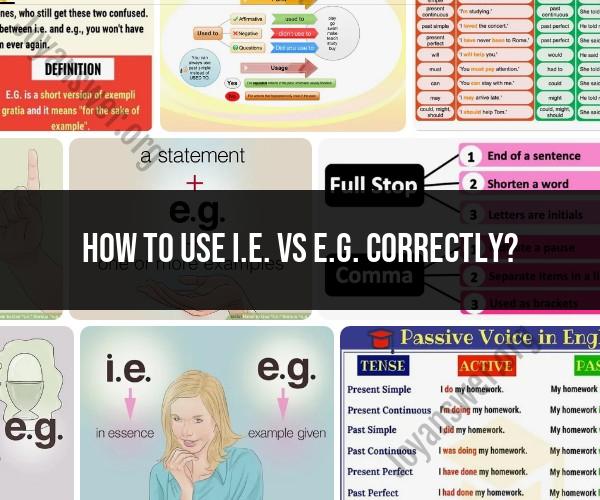How to use i.e. vs e.g. correctly?
"I.e." and "e.g." are Latin abbreviations used in English to clarify or provide examples in written text. They are often misused or confused. Here's how to use them correctly:
i.e. (Id est):
- "I.e." means "that is" or "in other words." It's used to provide further clarification or to rephrase something you've just mentioned. Think of it as a way to say, "What I mean is…" or "To clarify…" Here's how to use it:
- The computer has many useful applications, i.e., word processing and graphic design.
- She prefers outdoor activities, i.e., hiking and camping.
- "I.e." means "that is" or "in other words." It's used to provide further clarification or to rephrase something you've just mentioned. Think of it as a way to say, "What I mean is…" or "To clarify…" Here's how to use it:
e.g. (Exempli gratia):
- "E.g." means "for example." It's used to introduce one or more specific examples that illustrate what you're talking about. It's a way of saying, "Here are some instances." Here's how to use it:
- She enjoys a variety of outdoor activities, e.g., hiking, biking, and camping.
- You can find various fruits at the market, e.g., apples, bananas, and oranges.
- "E.g." means "for example." It's used to introduce one or more specific examples that illustrate what you're talking about. It's a way of saying, "Here are some instances." Here's how to use it:
To remember the difference between the two:
- "I.e." clarifies or rephrases; think of it as "In essence" or "In other words."
- "E.g." provides examples; think of it as "For example" or "For instance."
Both "i.e." and "e.g." are usually followed by a comma and are set off in parentheses or with commas when used within a sentence. They are valuable for making your writing more precise and clear, so use them appropriately to enhance the understanding of your readers.
How to use "i.e." and "e.g." correctly in writing?
The two abbreviations i.e. and e.g. are both commonly used in academic and professional writing, but it is important to know the difference between them and how to use them correctly.
- i.e. stands for the Latin phrase id est, which means "that is." It is used to introduce an explanation or clarification.
- e.g. stands for the Latin phrase exempli gratia, which means "for example." It is used to provide examples of something.
What is the meaning and usage of "i.e." in sentences?
i.e. is used to introduce an explanation or clarification. For example:
- The following animals are mammals, i.e., they give birth to live young and nurse their young with milk: whales, dolphins, and bats.
- The word "literally" used to mean "exactly," but i.e. in modern English, it is often used figuratively.
What is the meaning and usage of "e.g." in sentences?
e.g. is used to provide examples of something. For example:
- Some common types of flowers include roses, lilies, and tulips, e.g.
- There are many ways to reduce water waste, e.g., taking shorter showers and fixing leaky faucets.
Can you provide examples of sentences using "i.e." and "e.g."?
Here are some more examples of sentences using i.e. and e.g.:
- i.e. The term "artificial intelligence" (AI) refers to machines that can perform tasks that typically require human intelligence, i.e., reasoning, learning, and problem-solving.
- e.g. Some common examples of AI in use today include self-driving cars, virtual assistants, and spam filters.
- i.e. The word "decimate" used to mean "to kill one in ten people," but i.e. in modern English, it is often used more generally to mean "to destroy a large part of something."
- e.g. The bubonic plague decimated the European population in the 14th century.
What are some common mistakes to avoid when using "i.e." and "e.g."?
Here are some common mistakes to avoid when using i.e. and e.g.:
- Do not use i.e. or e.g. to introduce a list of items. For example, instead of saying "There are many ways to reduce water waste, i.e., taking shorter showers, fixing leaky faucets, and turning off the tap when you brush your teeth," you should say "There are many ways to reduce water waste, such as taking shorter showers, fixing leaky faucets, and turning off the tap when you brush your teeth."
- Do not use i.e. or e.g. to introduce a single example. For example, instead of saying "One way to reduce water waste is i.e. taking shorter showers," you should say "One way to reduce water waste is to take shorter showers."
- Do not use i.e. or e.g. at the beginning of a sentence. For example, instead of saying "i.e., taking shorter showers is a good way to reduce water waste," you should say "Taking shorter showers is a good way to reduce water waste."












